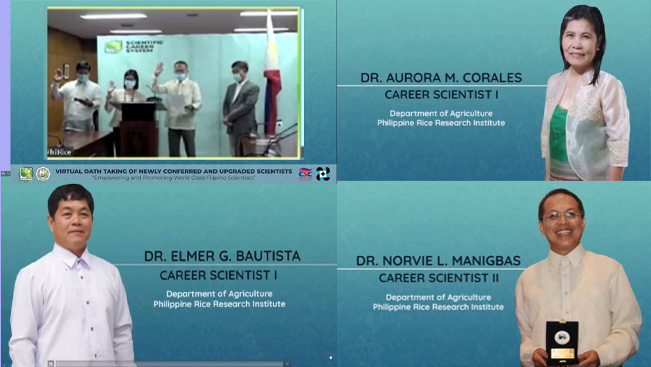
The Department of Science and Technology (DOST) lauds the Department of Agriculture-Philippine Rice Research Institute (DA-PhilRice) for having the highest number of active scientists in the Scientific Career System (SCS).
In the recent oath-taking ceremony of newly conferred and upgraded scientists, DOST Secretary Dr. Fortunato T. Dela Peña commends PhilRice after three of its experts landed in this year’s ranking.
“[With 12 scientists — nine Scientist I and three Scientist II], PhilRice has the highest number of active career scientists. I appreciate the newly conferred and upgraded scientists for their dedication and significant contributions to research in their respective areas of expertise,” he said.
Dr. Aurora M. Corales and Dr. Elmer G. Bautista were conferred the Scientist I rank, while Dr. Norvie L. Manigbas was upgraded to Scientist II rank by the Scientific Career Council.
Corales, chief science research specialist of PhilRice’s Technology Management and Services Division, is a community development worker, trainer, and a mentor to young professionals.
She is a published author in SCS and non-SCS journals, and a contributor to the book “Science and Art of Palayamanan Plus”, which received the 2020 Outstanding Monograph Award by the National Academy of Science and Technology.
She is a recipient of the 2006 Pagasa award by the Civil Service Commission and 2020 Siever Award for Professional Achievement by the Central Luzon State University. DA-PhilRice also cited her as an Outstanding Official in 2018.
She leads the Rice Business Innovations System Community Program that aims to spur the agro-entrepreneurial potential of the community as a springboard for social and economic transformation.
Meanwhile, Dr. Bautista, supervising science research specialist of PhilRice’s Rice Engineering and Mechanization Division, is an agricultural engineer for 27 years.
He leads the Mechanization of Rice and Rice-based Farming and DA-Bureau of Agricultural Research projects including WateRice, Multi-purpose Seeder, and RiceStrawPH. In these studies, he promotes practices such as land reformation through laser leveling, mechanical transplanting, seedling preparation, and sustainable rice straw management practices.
Bautista has significant works related to Life Cycle Assessment of Philippine rice production published in several papers and SCS accredited journals, one of which was awarded with Gold Poster Award of 2014 during the 11th International eco-balance conference held in Tsukuba, Japan.
Manigbas, chief science research specialist of PhilRice’s Plant Breeding and Biotechnology Division, is a senior rice breeder who was conferred the Scientist I rank in 2013.
As project lead, he is involved in developing new rice varieties for a rainfed environment, and varieties that are adapted to drought, salinity, submergence, and high-temperature. His distinguished contribution was the development of the first direct wet-seeded rice variety NSIC Rc 298 in 2012 and the first heat-tolerant rice variety NSIC Rc 600 in 2020.
His projects generated substantial funding for rice production and mechanization that benefitted 15 farmers’ cooperatives in Luzon and Visayas.
Manigbas is a recipient of the Presidential Lingkod Bayan Award in 2018 and a consistent outstanding employee of DA-PhilRice.
The Scientific Career System deals with the recruitment, career progression, recognition, and reward of scientists in the public service as a means of developing a pool of highly-qualified and productive scientific personnel.
The system is co-implemented by the Civil Service Commission and DOST.




